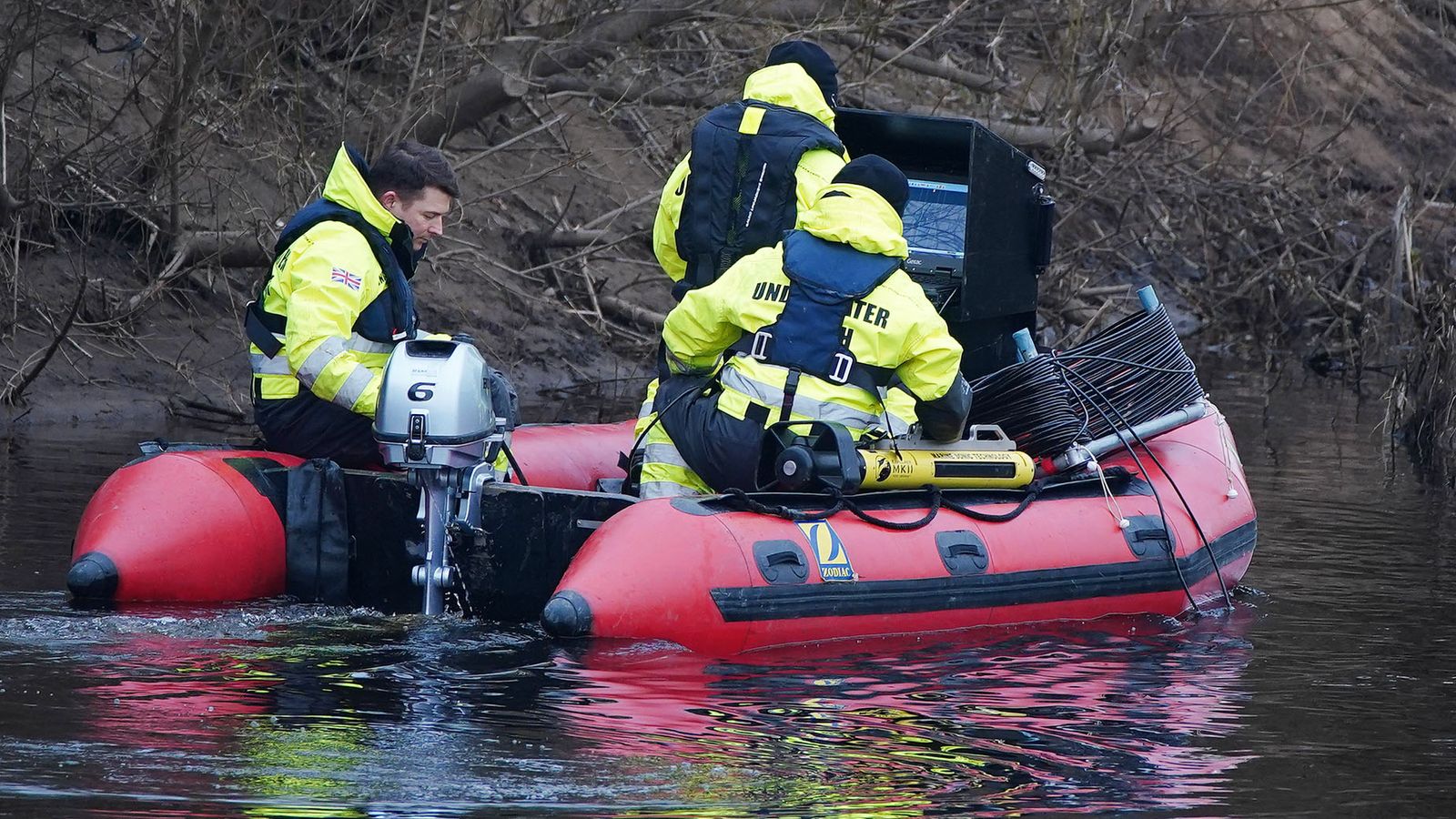Dive specialist says knowing Nicola Bulley was ‘high risk’ would have ‘changed our whole search’

The dive specialist who has been helping police in the hunt for Nicola Bulley says knowing the missing mum was “high risk” would have “changed our whole search”.
Peter Faulding, chief executive of search team Specialist Group International, told Sky News police in Lancashire never made him aware that Ms Bulley had issues with her mental health.
Asked if having that information would have impacted his search, he said: “It would certainly change my search because, from day one, I’ve said this case is so baffling because water at the bottom of the bank at the point where Nicola’s phone and the dog’s harness were found was only two feet deep.
“If she’d have fallen in she would have landed on rocks, she would not have drowned. That’s what has baffled me.”
Mr Faulding said he remained in contact with Paul Ansell, Ms Bulley’s partner, and her family – who released a statement today calling for “wild theories” about her personal life to stop.
He added: “We thoroughly searched that piece of river as we have been tasked by the police.
“If somebody tries to drown themselves or if they are in a strange state of mind they might just wander off somewhere. She might be lying in a ditch, she could have wandered into the woods.
“So that’s the point with a vulnerable person, you don’t know where they’re going to go. It would have changed our whole search.”
Read more about Nicola Bulley:
YouTuber fined for joining Nicola Bulley search
Reputation ‘destroyed’ by police revelations
Timeline of mum’s last movements before she disappeared
How local knowledge could help despite ‘toxic’ interest
Explaining further, he added: “If she had slipped, even if she had gone into deep water she would have been found.
“She would have gone in roughly where she drowned. That is what we find on average with the drownings and suicides we deal with each year – they’re normally found within a couple of metres of where they go down.
“If she was trying to drown herself she may have drifted and potentially gone over the weir, but the police divers searched that area very thoroughly on the day she went missing and there was no sign of her. And that’s why I said this was a baffling case.”
‘A very cruel thing to do’
Asked what he thought about the police releasing personal information about Ms Bulley’s mental state, he said he’d never before seen such information disclosed.
Mr Faulding said that even as a person involved in the search he would normally just be told the individual was “high risk” and not be told specifics of what troubles the missing person was struggling with.
He added: “Normally when you’re searching for a high risk person you just get the information that they’re high risk and that’s it. That’s enough to tell us that someone may harm themselves or come to some harm.
“That’s as a searcher.
“The way it has been released to the media should not have been done. I’ve been getting calls from senior police officers asking what is going on.”
He added that, in his view, the family would be “devastated” that information about the missing mum’s struggles with alcohol had been made public, calling it “a very cruel thing to do”.
However, in a statement released through the police on Thursday, Ms Bulley’s family said they were aware of the police’s plans to release her personal information.
They said the police “know the truth about Nikki”.
Reputation ‘destroyed’ by police revelations
Speaking before the family released the statement, former detective Martyn Underhill said that Lancashire Police have “completely destroyed” Ms Bulley’s reputation by revealing her struggles with alcohol.
He told Sky News that he had never “seen such a level of detail” released in a missing persons case and added that one had to ask why officers were releasing it now.
Please use Chrome browser for a more accessible video player
1:14
Police ‘completely destroyed Nicola Bulley’s reputation’
Speaking to Sky’s Kay Burley, Mr Underhill, who was a detective involved in the Sarah Payne case in 2000, said he was “confused” by Lancashire Police’s strategy.
“You can understand why some people are saying it’s victim blaming to protect their own reputation, ” he said.
“I can’t see how it progresses the case any further forward now we’re three weeks in, to be frank.”
Having apparently found no trace of the mother-of-two for more than 20 days, police yesterday revealed that they had classified Ms Bulley as “high risk” owing to “a number of specific vulnerabilities”.
After initially refusing to elaborate on what those vulnerabilities were at a press conference, Lancashire Police subsequently released a statement saying: “Nicola had in the past suffered with some significant issues with alcohol which were brought on by her ongoing struggles with the menopause and that these struggles had resurfaced over recent months.”
“This caused some real challenges for Paul and the family,” it added in a reference to Ms Bulley’s partner, Paul Ansell.
‘Unprecedented’ search fails to solve baffling case
Detectives also revealed that they had been at Ms Bulley’s house the week before she disappeared to check her welfare.
Ms Bulley has been missing since 27 January after vanishing when she took her dog Willow for a walk by the River Wyre in Lancashire.
She was last seen at 9.10am that day, after taking her usual route with her springer spaniel, alongside the river.
Her phone, still connected to a work call for her job as a mortgage adviser, was found just over 20 minutes later on a bench overlooking the riverbank, with her dog running loose.
Please use Chrome browser for a more accessible video player
5:45
Missing Nicola ‘had alcohol issues’
Since she vanished, huge public and media interest has resulted in what police described as “false information, accusations and rumours”.
Police insist an “unprecedented” search – of both the River Wyre, downstream to Morecambe Bay and miles of neighbouring farmland – has taken place to find her.

